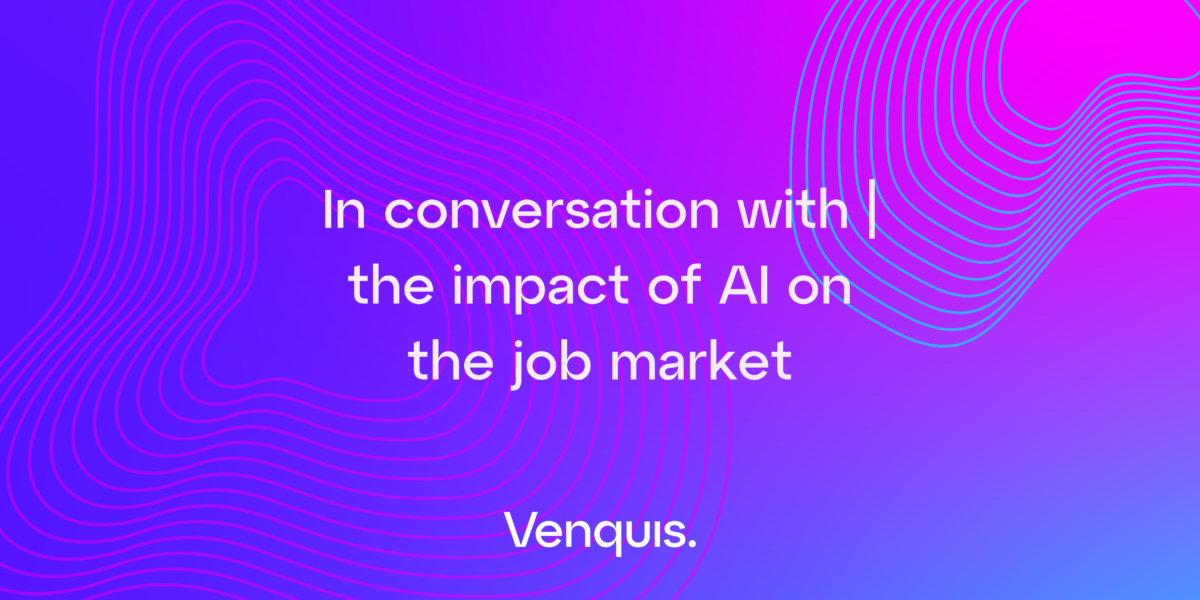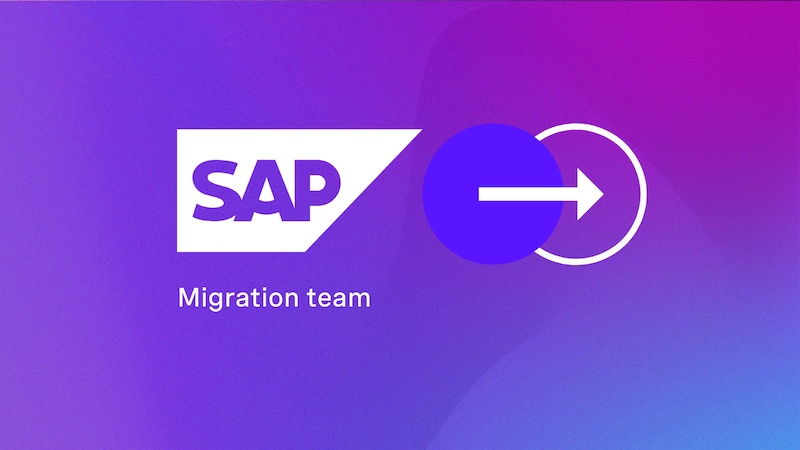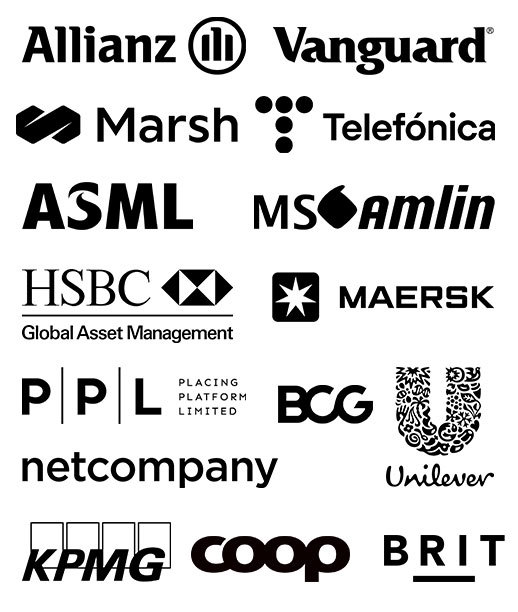Artificial intelligence (AI) continues to gain momentum – as does the conversation about its advantages and potential implications. For the Venquis team, a lot of our conversations – both internally and with clients and candidates – centres on the workforce.
In the first of our new series, In Conversation With… we bring together four Venquis voices – Associate Director DACH, Tom Fernandez-Buckley, Client Partner, Jack Waller, Marketing Manager, Vicki Hayward, and Candidate Partner, Rhea Jobanputra— to chat about AI, the challenges it presents and the exciting opportunities on the horizon. Together, they offer a unique perspective on how AI is influencing talent acquisition and staffing solutions.
How AI is already shaping the future of work
Vicki: AI is advancing at a rapid pace, and the impact of its integration is already being seen in our day-to-day work lives. For you guys, what are the most significant changes you’ve seen that will impact how we use AI in the future?
Tom: One of the biggest shifts we’ve seen internally has been how AI is supporting us in matching candidates to roles faster and more successfully. It’s not just about speeding things up, though – AI is allowing us to really concentrate on the human sided of things. Building relationships, ensuring that our candidates are likely to fit into a client’s company culture – that deeper fit is what makes all the difference.
Jack: Absolutely. AI has been a game changer for us because it lets us spot trends in how candidates behave – what they’re looking for, how they respond to certain opportunities. With that insight, we can be way more personalised in how we engage with them. It’s not a one-size-fits-all approach anymore – it’s seamlessly tailored to each candidate.
Rhea: What’s really exciting for me is how much time AI saves us. It’s taking care of those admin tasks that used to eat up chunks of our day. Now, we can spend far more time where it matters – building real, personal connections with candidates and clients.
The Venquis take: The integration of AI represents a pivotal moment, not just for the Venquis team, but for the workforce as a whole. This technology doesn’t exist to replace human roles, but to enhance human capabilities. With AI’s ability to process massive amounts of data at speed, our candidate and client partners can connect and build more successful relationships and offer a more tailored experience. This shift points to a future where technology and human intuition work hand-in-hand, transforming how communicate and operate across our business and beyond.
AI’s real impact on jobs: creating or eliminating human roles?
Vicki: I’m not sure if you guys agree, but there doesn’t seem to be a great deal of nuanced discussion around the real impact AI is having on jobs. There are very loud concerns around jobs being eliminated, without the necessary proof to back it up, almost. Do you think common discourse is really recognising the opportunities AI presents in terms of creating new roles and opportunities for those who can quickly adapt to emerging technologies?
Tom: I think it depends on where and with who you’re having these discussions. AI can manage very specific tasks, but it’s our human judgement that makes the critical decisions. At Venquis, we use AI to amplify what we’re already excellent at, which is ensuring our candidates closely align with our clients’ needs – such as values and culture – and this remains a distinctly human responsibility.
Vicki: Absolutely, I agree. AI enhances our capabilities, but it can’t be a substitute for that human touch. In content marketing, for example, while AI can certainly support us in ideation and initial drafts of copy, it can’t replace a human. We can tell when content is written by AI, and it really does impact brand sentiment with potential clients too. Which means, we have to be intentional about developing our skills alongside the technology. It’s essential to ensure that, as AI evolves, we maintain a focus on the human elements that truly drives success.
Rhea: The human element is crucial. While there are concerns about job losses, what we’re seeing is that AI is also opening up a wealth of new opportunities – especially for those willing to adapt. Roles that require more creativity and emotional intelligence are becoming more important, and that’s where the human element really comes into play.
The Venquis take: As labour intensive and time-consuming tasks are automated, the demand for human skills – such as emotional intelligence, creativity and strategic thinking – will likely increase. Organisations that lead with this type of adaptability can create an innovative workforce that thrives alongside AI.
Balancing skills and regulation in AI
Vicki: So, team, the emphasis on human skills in light of increasing automation highlights the need for a shift in workforce development strategies, am I right? Investments in upskilling employees to ensure they are equipped to handle the complexities of AI, while maintaining a strong focus on interpersonal skills is a clear focus from this conversation. What else?
Rhea: It’s fascinating to consider what skills are going to be truly valuable in the future. We’ve focused quite a bit on the human element, but as we look to the future, it’s really important to consider how those working on AI projects will address people’s concerns – it seems like we’re heading into a phase where an entirely new toolkit will become essential, and that will likely start with younger generations at school.
Tom: Data literacy from a young age will become crucial. Being able to interpret data and insights generated by AI tools will become a fundamental skill. Equally important, as ever, will be soft skills – like communication and empathy – they’ll remain essential as we navigate the more complex interactions between AI and the world.
Jack: I agree. There’s a delicate balancing act emerging. As AI takes over routine tasks, those who excel at relationship-building and strategic thinking will stand out. Teaching younger generations how to be adaptable, ready to embrace new technologies as they emerge, will become the norm.
Vicki: And while we’re focusing on these skills, we can’t overlook the importance of regulation. And that needs to be a human priority. AI is complex, and establishing guidelines that protect the workforce, while promoting ethical practices, is vital.
The Venquis take: Establishing clear regulations that address the ethical use of AI to ensure transparency, fairness, and accountability is important too. A holistic approach will enhance individual capabilities but will contribute to a more resilient and adaptable organisational culture – this will ensure that, as we evolve, we do so responsibly and ethically.
Is the AI boom sustainable?
Vicki: With ethical practices and long-term implications for the global workforce in mind, the sustainability of the AI boom raises an important question: is the AI boom sustainable?
Tom: AI is becoming an integral part, not just to our operations, but to those of our clients too. It’s enhancing our daily tasks, helping us identify and engage with experts more efficiently across various sectors… We’re able to expand our reach while still providing exceptional service. As AI continues to evolve, I can only see that improving. So yes, I’d say the boom is certainly sustainable.
Rhea: Agreed. The manner in which AI has already transformed our processes is profound, and as we know, the Venquis Vision has a strong focus on the continued proliferation of AI. It’s opening up new avenues for us to connect with our candidates and providing them with value like never before – I can only reiterate what Tom said. I’m excited to see how it develops.
Jack: Based on conversations I’m having with clients, and what I’m seeing internally, the key is to embrace AI responsibly. There will be leaders out there that simply say ‘throw Chat GPT at it’ without a real vision, but what we’re doing internally is creating a process that truly adds value for clients and candidates. It’s all about creating an environment where everyone thrives because of the addition of AI – that’s where it becomes truly sustainable.
Vicki: It’s exciting, isn’t it? We’re embracing these advancements – while keeping an eye on the ethical implications (I’ll bang on about this daily) – like all relationships, our relationship to AI needs to focus on transparency and accountability. Without either, we start to break down the trust we’ve established among employees, clients and candidates. It’s a delicate balance – one we’re prioritising internally!
The Venquis take: As organisations continue to rely on AI, it’s crucial to establish guidelines and frameworks that ensure responsible usage. This involves not only mitigating bias in AI systems, but also prioritising transparency and accountability in AI-driven decisions. A balanced approach will help to establish and maintain trust among employees, clients and candidates. This will ultimately lead to a more sustainable future for AI skills in the job market.
In Conversation With… A conclusion
As Venquis continues to explore the intersection of AI and talent acquisition, the conversations and insights shared by our team provide a glimpse into the future. By embracing technology while retaining the essential human element to what we do, a fundamental aspect of our company vision is to see us leading the way in transforming the very foundations of staffing solutions.
Search for artificial intelligence roles with Venquis today.









